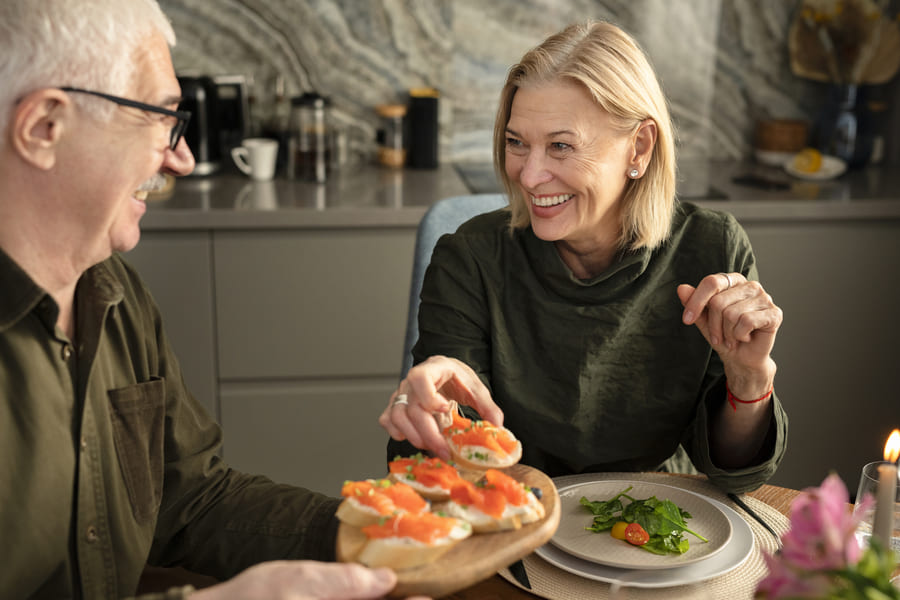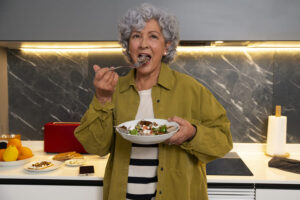
Senior Care Nutrition Guide
Nutrition in old age has its own specific characteristics. The body still needs energy to sustain life, but physical activity decreases, metabolism slows down, and age-related illnesses appear. As an essential aspect of senior care, these factors must be taken into account when choosing foods and planning the daily diet.
Proper nutrition leads to improved health and well-being, while poor nutrition shortens life expectancy and causes complications of existing diseases. These issues can be avoided by strictly following a dietitian’s recommendations.
Foods for the Elderly: What to Eat and What to Avoid
A monotonous diet becomes boring and can lead to digestive disorders. However, not all foods are suitable for people over the age of 70, 80, or even 90. As part of effective senior care, meals should be easy to digest, low in calories, but still tasty and nutritious. With sufficient intake of trace elements and natural vitamins, the aging process can be slowed, and life expectancy extended.
Protein intake should be reduced since growth has stopped and less energy is required for daily tasks. On the other hand, plant fiber is essential to maintain gut microbiota and support intestinal motility.

The elderly diet should necessarily include:
- Porridges: oatmeal, buckwheat, millet, cornmeal, and occasionally rice;
- Vegetables: nearly all kinds, raw, boiled, stewed, or steamed;
- Fruits: raw or baked, as well as in compotes;
- Herbs: to provide essential vitamins and minerals;
- Dairy products: to aid digestion;
- Fish: low-fat varieties;
- Honey: an ideal alternative to sugar and sweets;
- Eggs: no more than 2–3 per week.
In small amounts, the diet may occasionally include lean meat, butter, baked goods, beans, and mushrooms. However, some foods are best avoided altogether.
Prohibited items include:
- Carbonated and alcoholic beverages;
- Coffee;
- Lard;
- Smoked meats.
- To maintain health, it’s also important to limit salt, canned foods, sugar, and pastries.
How to Create a Meal Plan for an Elderly Person
As people age, the digestive system slows down. Food is not broken down and processed as efficiently as in younger years. As a result, many elderly people complain of a lack of appetite or a heavy feeling after meals. To prevent discomfort, the diet must be carefully planned, including only meals that are easily digested.

A sample meal plan may include:
- Early morning snack: Herbal tea with a small sandwich and cheese. This light snack helps prepare the body for the next meal.
- Second breakfast: Porridge, accompanied by baked fruit or vegetables.
- Lunch: The main and largest meal—soup, a main course, a light vegetable salad, and juice or fruit compote.
- Afternoon snack: Natural juices (non-carbonated), yogurt, milk, or fruit.
- Dinner (no later than 7 PM): Options include porridge, cottage cheese pancakes, baked vegetables, mashed potatoes, along with compote or tea.
Eating Tips for the Elderly
Both overeating and undernourishment are dangerous for older adults. Overeating may lead to obesity and high blood pressure, while insufficient food intake can cause weight loss, fatigue, and low hemoglobin levels.
Simple rules to stay healthy and energetic:
Eat frequently—five meals a day.
Control portion sizes.
Stick to a consistent eating schedule.
By following these guidelines, elderly individuals can maintain better health, avoid complications, and enjoy a higher quality of life.

